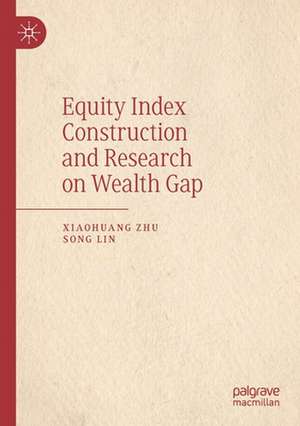Equity Index Construction and Research on Wealth Gap
Autor Xiaohuang Zhu, Song Linen Limba Engleză Paperback – 23 aug 2020
| Toate formatele și edițiile | Preț | Express |
|---|---|---|
| Paperback (1) | 381.43 lei 6-8 săpt. | |
| Springer Nature Singapore – 23 aug 2020 | 381.43 lei 6-8 săpt. | |
| Hardback (1) | 385.84 lei 6-8 săpt. | |
| Springer Nature Singapore – 22 aug 2019 | 385.84 lei 6-8 săpt. |
Preț: 381.43 lei
Nou
Puncte Express: 572
Preț estimativ în valută:
72.100€ • 75.63$ • 60.92£
72.100€ • 75.63$ • 60.92£
Carte tipărită la comandă
Livrare economică 21 martie-04 aprilie
Preluare comenzi: 021 569.72.76
Specificații
ISBN-13: 9789811395567
ISBN-10: 981139556X
Pagini: 181
Ilustrații: X, 181 p. 42 illus., 39 illus. in color.
Dimensiuni: 148 x 210 mm
Greutate: 0.26 kg
Ediția:1st ed. 2019
Editura: Springer Nature Singapore
Colecția Palgrave Macmillan
Locul publicării:Singapore, Singapore
ISBN-10: 981139556X
Pagini: 181
Ilustrații: X, 181 p. 42 illus., 39 illus. in color.
Dimensiuni: 148 x 210 mm
Greutate: 0.26 kg
Ediția:1st ed. 2019
Editura: Springer Nature Singapore
Colecția Palgrave Macmillan
Locul publicării:Singapore, Singapore
Cuprins
1. Introduction.- 2. Analysis of Turning Points in Equality and Wealth Gaps.- 3. Wealth Gap Index Construction and Data Analysis.- 4. Multiple Equality Indexes Related to the Wealth Gap.- 5. Analysis of the Turning Point of Wealth Gap Index and Economic Growth.- 6. Wealth Gap and Social Development.- 7. Conclusions from Mongoose Social Equality Index and Policy Suggestions.
Notă biografică
Xiaohuang Zhu is the President of the Financial Conduct and Legal Act Research
Society of the China Behavior Law Association and former Chairman of the Board
of Supervisors of CITIC Group, the former President of CITIC Bank, the former Chief Risk Officer and Vice President of China Construction Bank. He holds a Ph.D. in International Economics.
Song Lin is the Associate Dean and Professor at the Business School, Central University of Finance and Economics, China and has published numerous papers in top journals. His major research interests include entrepreneurial management, SME management, and strategic management. He holds a Ph.D. in Management.
Textul de pe ultima copertă
This book constructs a Chinese Social Equality Index–the Mongoose Social Equality Index–with the wealth gap index as its core, and the legal equality index, the socio-cultural equality index, and the financial equality index as its supplement. The book focuses on the influence of the wealth gap on economic and social issues. Empirical research shows that there are three turning points in the influence of the wealth gap index on economic growth: discrepancy turning point, golden turning point and destructive turning point. Based on the latest data,the current expected wealth gap index in China has surpassed the destructive point. This means that wealth brought about by economic growth will largely go to the rich, which aggravates inequality and even brings forth a potential economic recession. Meanwhile, the index also indicates that, as the Chinese economy develops, social equality has been on a noticeable decline. This book will be of interest to economists, China watchers, and political scientists.
Xiaohuang Zhu is the President of the Financial Conduct and Legal Act Research
Society of the China Behavior Law Association and former Chairman of the Board
of Supervisors of CITIC Group, the former President of CITIC Bank, the former Chief Risk Officer and Vice President of China Construction Bank. He holds a Ph.D. in International Economics.
Song Lin is the Associate Dean and Professor at the Business School, Central University of Finance and Economics, China and has published numerous papers in top journals. His major research interests include entrepreneurial management, SME management, and strategic management. He holds a Ph.D. in Management.
Caracteristici
Introduces a new Chinese Social Equality Index, the Mongoose Social Equality Index Analyses the influence of the wealth gap on economic and social issues in China Provides policy suggestions as China moves on towards a 'society of medium prosperity'
